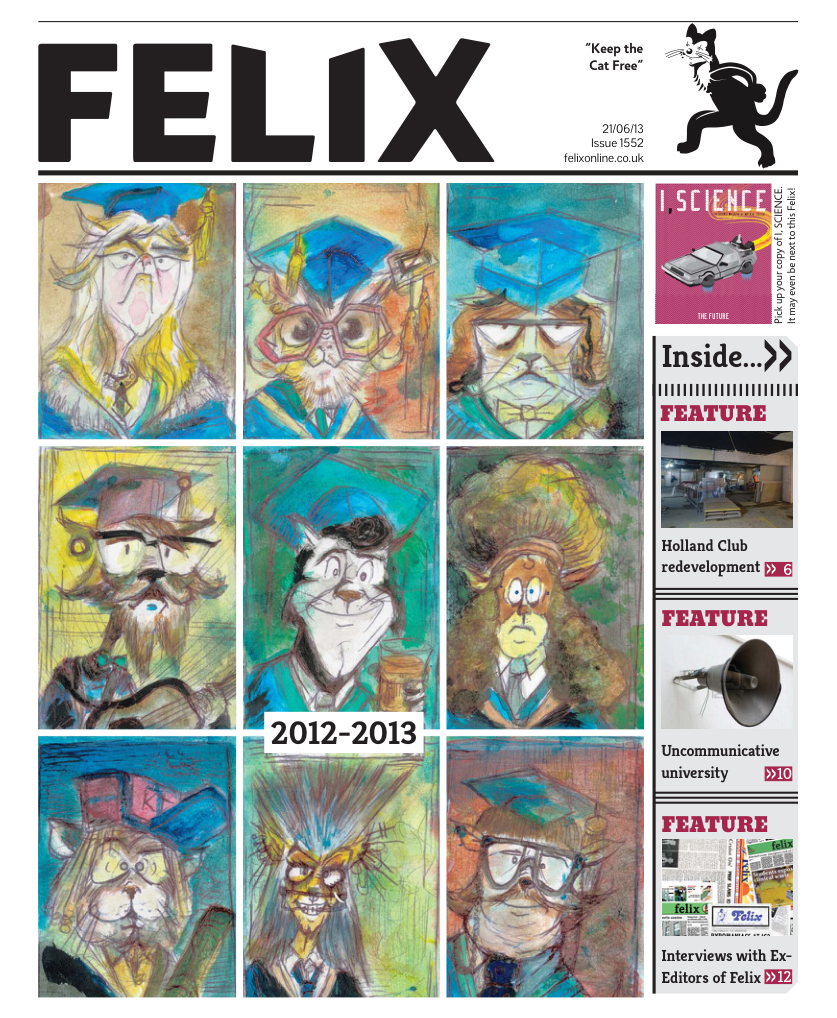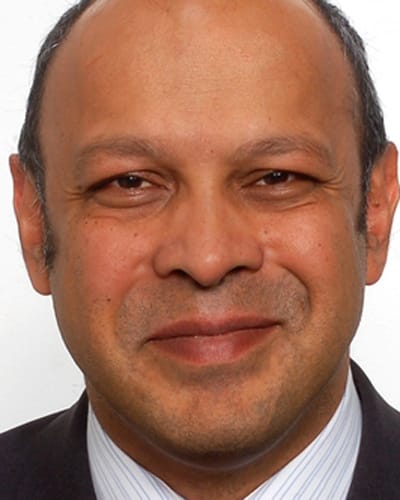Uncommunicative University
Oli Benton investigates the inner workings of the College and the Union, and what people do and don’t know about how they are run

I wrote an article last month about how Imperial College is run like a business. This business doesn’t have the interests of the students or its academics at heart. The week after my article, a letter from Ian Howgate, hockey player and former Imperial College Union President, followed up on this.
Both of these articles caused a little bit of a stir; I received an email from Debra Humphris, Pro-Rector (Education) and Neil Mosley, Head of Sport Imperial, voicing their concerns and asking to discuss things further. Following this, I set up a meeting with Paul Beaumont (Union President), and several other people who are involved in College life from undergrads, post docs and through to senior academics involved in designing courses. The following spread hopes to expand on where I think College and the Union is going astray, what they are trying to do about it, and if this is enough.
I don’t know all the solutions; if I did I would have run for Union President (there’s always next year folks!), but hopefully this can be a starting point – something to kick a conversation off at least.
All of the numbers presented here are easily obtainable by a (not that quick) trawl through publicly accessible documents on the internet. All the figures are there. I have edited the online comments so they didn’t consume the whole two pages, and have drawn several conclusions from a non double blind straw poll of about 30 students in the Union on a Thursday night.
There are big changes on the horizon in higher education. Degrees have evolved from being direct precursors to employment to being a tool to go into an unrelated, high paying job where the academic skills you spent four years of your life slaving away on mean nothing. I’m looking at you, Mr Management Consultant. To try and keep up with what students need from their time at university, College is going to have to start listening to us more seriously and more often; no longer can they afford to use consulting students as a box ticking exercise.
We as students, adults and members of this university do actually have a voice. Most people don’t realise this, but at the highest levels there are people who are willing to listen and people that do care. The problem comes in bridging the gap between what the average student wants and needs and what these people hear. Communication, that overused buzzword, is again the key.
We, the student body, were not consulted on Acton. I’m not suggesting, as one academic did, that commercially sensitive information be leaked, just that the consultation with the student body (and the oft overlooked academic body) should have occurred well before money reared its ugly head.
#AgainstActon was too little too late and there was nothing we could do to stop it. The campaign did, however, manage to get a response out of the College Management Board. No idea who they are? No I didn’t have any either; they are the people that make the day to day decisions and ultimately run Imperial. Why does nobody know who this extremely powerful group of people are?
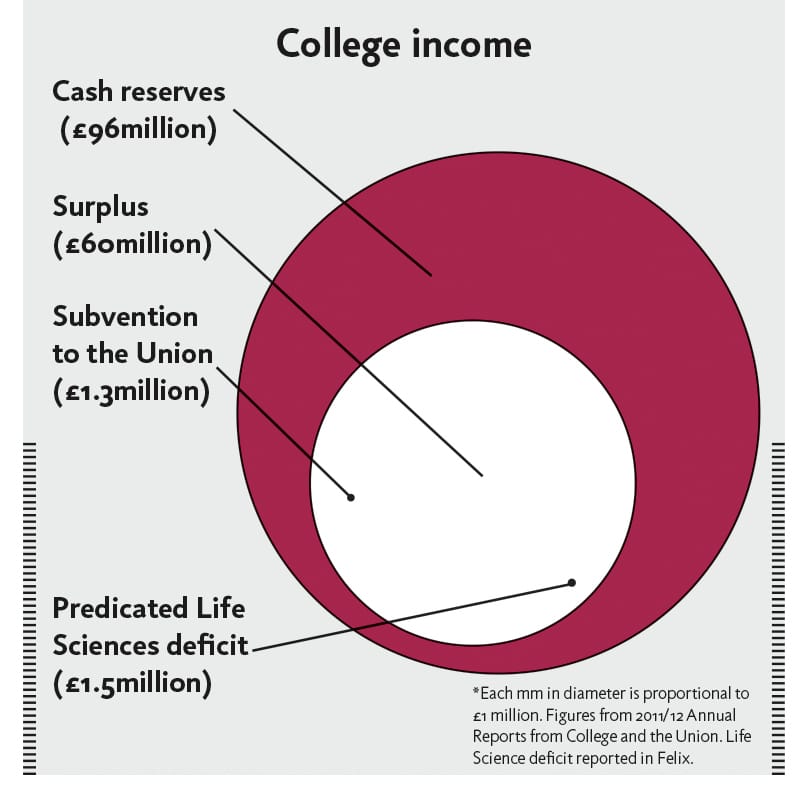
This response was more than all those vociferous campaigns against the Life Sciences cuts got. An actual response from senior management seems to have acknowledged that this was a mistake. Although they will never admit this in those words, they are at least trying to put it as right as they can at this late stage by conducting a review. I love reviews. A detailed review of Evelyn Gardens and Garden Hall to actually see what condition they are in? Perfect. But why were decisions made before this detailed information was known?
The Union website also states that negotiations over Evelyn Gardens’ lease are also ‘too commercially sensitive’ to be widely consulted on – surely this is the perfect time to listen to our representatives, and avoid a repeat of the Acton fiasco.
Number Crunching: £364,770 = Total subvention to all the clubs, societies and projects from the Union.
Commercial priorities seem to take precedence over many aspects of College life. They are obviously an important part of any business; especially one as large as Imperial. The College had an income of £765 million last year, with a surplus (read: profit) of £63 million; a surplus to turnover ratio of 8.3% (the percentage of the money made that is profit). This number is high compared to other institutions – though not as high as the year before when it was 13%. A brief search of other similar organisations yielded some interesting results (shown in the bar chart over the page); the going rate seems to be about 2-4% with no-one else coming close to our margin. So if we’re outperforming our competitors by making more money than they are, what are we doing with this extra cash? It’s certainly not going to the Union, which received a lowly £1.4 million last year, nor is it used to give extra time to ailing Departments while they sort their financials out. (See Life Sciences who reportedly had a deficit of 1.5 million.) So where is this money going?
Number Crunching: £364,000 = Sir Keith O’Nions’ (President & Rector of Imperial College London) salary
Maybe we’re short of money and don’t hold enough reserves? If we paid off all of our outstanding debt tomorrow, College would still be sitting on a cool £96 million.
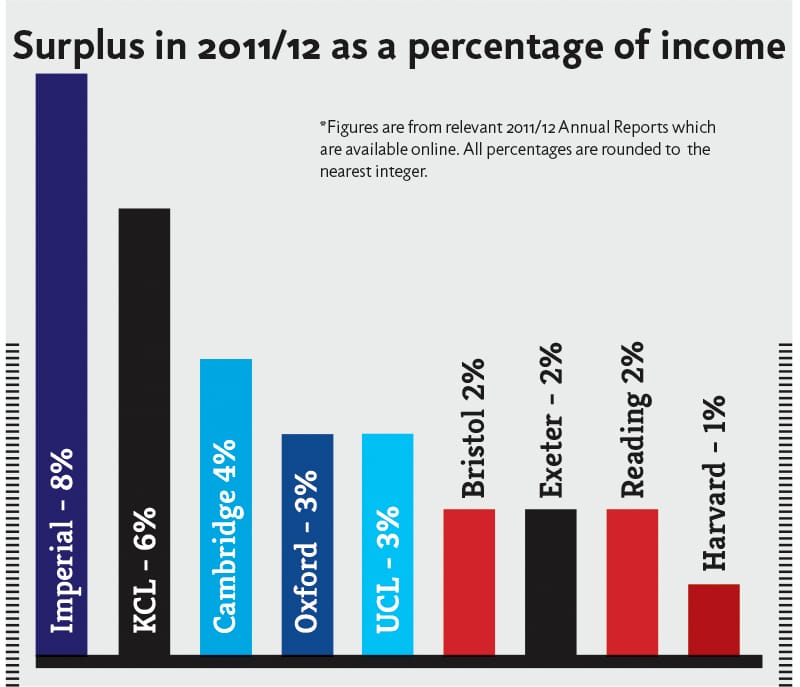
Flexibility is an issue with all large corporations. Imperial is no different; red tape regularly obstructs novel projects or ideas. Imagine if £50,000 was set aside to pay for flights for 50 students to do an IROP in the US, and another £50,000 to let 200 keen students go to conferences; to show them off to the rest of the world and to actually further their learning. So far we’ve spent £100k, 0.16% of the surplus last year, made a huge difference to 250 people (3% of undergrads) and shown our best and brightest off to academics around the world. But there are massively limited resources currently available for opportunities like this; we as a university are missing an opportunity.
Imagine what we could do if College aimed to only make 4% profit next year; we’d have an extra £30 million to pump back into teaching, research and that other key buzzword, the ‘Student Experience.’ What is the ‘Student Experience’? I can’t define it exactly and I’d challenge anyone else to. However, with the increasing commercialisation of higher education in the UK, universities across the board are trying to improve it, trying to draw the best students to their institutions. The people making the decisions, the College Management Board and the vast majority of College Council generally have limited contact with students, which hinders their approach to improving it. Some large strides are being made trying to make this right; the idea of talking to us to find out what we want and need is starting to take hold, but it is far from across the board.
But is the Union any better?
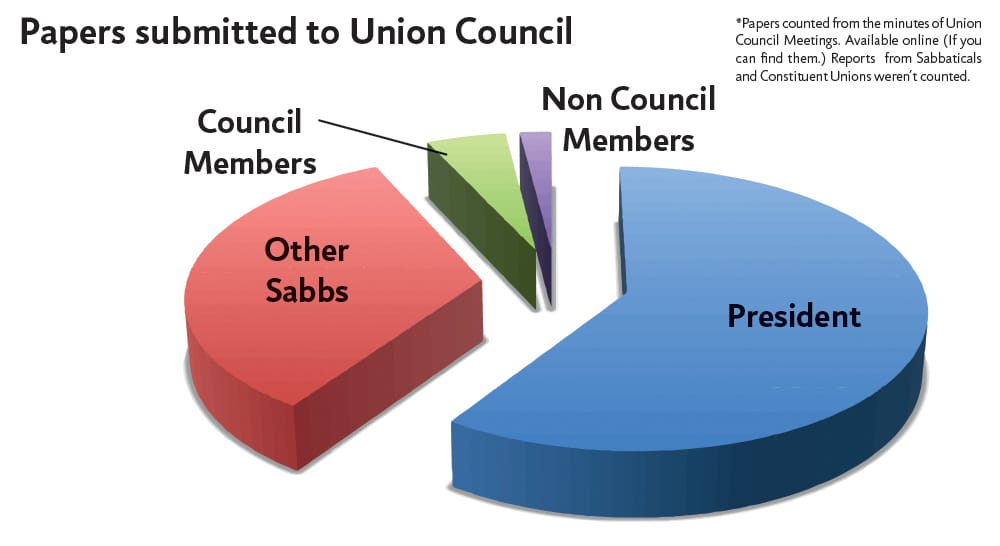
Our one link is the Sabbs; the Union President sits on the highest board in College, the College Council. This is quite a rare privilege, and one that has been revoked previously, but we do have a voice here. A voice that could be used by everyone; those who want a moan or to make things better. But how can the average student get his view across? Supposedly the Union Council; anybody can go to one of their meetings and have their say. You won’t get a vote, and you won’t know what they are discussing until you go along. The files are online and available but this is not the same as advertising the agendas. Only one paper this year was submitted by a non Council member while 93% were submitted by the Sabbs. Is this representation?
Key Numbers: £765m = College Income 2011/12. £63m = Surplus 2011/12
So what happens during a meeting? The Union Council vote on papers covering a wide range of topics including recommendations to College. These papers then allow the Sabbs to take the “Official View” of the students to their other meetings throughout College and lobby the people with real power to make changes. College can and do ignore our recommendations; particularly on some of the more contentious issues, as is their right. Generally however they do listen and want to make changes as they want us to be happy. It’s in their best interests both financially and academically. The “You Said We Did” campaign ran by the Union this year is trying to highlight the steps that we are making and trying to make Union Council seem more than just a lobbying group.
40% of students believe ICU is run for profit
It is slightly more than this. We do have the power to make changes to things that directly affect the Union. Consider this example: I present a paper to Council resolving to never have another Summer Ball. If this passed then the Union would never have another Summer Ball. (It would have to pass the Imperial College Union Trustee Board first but assume theyrubber stamp it.) To reiterate: anyone can present a paper and everyone on Council gets a vote. This suddenly gives more weight to every position that comes with a seat on the Council.
45% of students don’t think ICU is the voice for students
Or does it? Are we all that apathetic? I can’t believe this. We do care; highest election turnouts in the country do not scream apathy. I think we just need to feel that we can actually make a difference. I think that it is that people feel powerless against ‘The Union’ or ‘The College.’ We don’t get a lot of power but we could use what we have a lot more effectively.
Without trying to sound too hacky or desperate, I implore you to get involved. Stop moaning and make some changes. If only by writing a moany article in Felix, make the administrators sit up and listen. They control your time at College but they need us to be on side. Call their bluff occasionally, make them think – this is the only way to improve the ‘Student Experience’ here – they’ve shown they can’t do it by themselves.

Sources for figures: The surplus in 2011/2012 as a percentage of income is taken from relevant 2011/12 Annual Reports which are available online. All percentages are rounded to the nearest integer. The papers submitted to Union Council is from he minutes of Union Council Meetings. Available online (If you can find them.) Reports from Sabbaticals and Constituent Unions weren’t counted.

